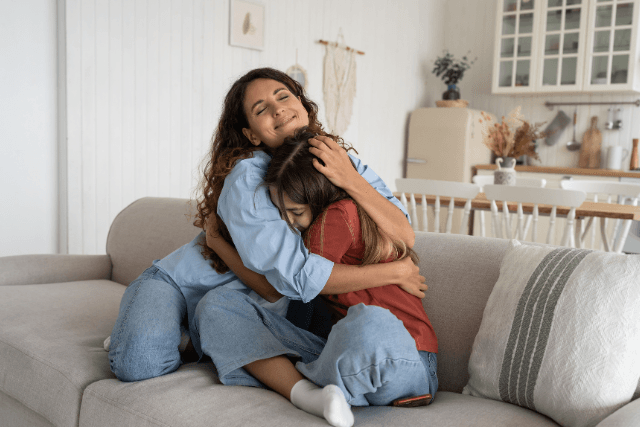
Recognizing anxiety symptoms in children early is crucial for their well-being. Anxiety in children is increasing, partly due to the impact of COVID-19, which has led to isolation, lack of social interaction, and increased screen time. These factors have heightened fears, anxiety, and difficulties in socializing.
What is Anxiety in Children?
Anxiety is a feeling of worry, nervousness, or excessive self-doubt about something specific, whether realistic or not. Unlike normal childhood fears like fear of school, monsters, or not feeling good enough, anxiety disorders significantly disrupt daily life and emotions.
Common Symptoms of Anxiety in Children
Anxiety in children can look different from anxiety in adults. It often includes signs of dysregulation, such as moving around a lot, picking at their skin, or constantly messing with their hair. Common symptoms can include:
- Physical Symptoms: Stomach aches, headaches, chest tightness, sweaty hands, feet, or other body parts, feeling shaky, mouth dryness, headaches, difficulty breathing.
- Emotional Symptoms: Excessive worry, fear, sadness.
- Behavioral Symptoms: Avoidance, clinginess, running away to avoid situations like going to school, frequent stomach or headaches before school.
Types of Anxiety Disorders in Children
There are also various types of anxiety disorders that can affect children, including:
- Separation Anxiety Disorder: An exaggerated fear of being separated from parents or caregivers, leading to refusing to go anywhere without them, sleep alone, or go to school.
- Generalized Anxiety Disorder: Persistent and excessive worry about various aspects of life.
- Panic Disorder: Recurrent and unexpected panic attacks.
- Phobias: Intense fear of specific objects or situations.
- Social Anxiety Disorder: Extreme fear of social situations and being judged by others.
There are different types of anxiety, and many children can be affected with anxiety due to genetic predisposition (i.e., there is a family history of anxiety), exposure to traumatic events, impacts of trauma, or their experiences in society such as school and/or social environment.
Tips for Parents to Help Children Manage Anxiety
Here are some practical tips for parents to help their children manage anxiety:
- Identify Safe Spaces and People: Find places and individuals that make your child feel secure.
- Understand Their Feelings: Help your child understand how their body feels when they are anxious.
- Communication Strategies: Spend quality time together, have 1:1 conversations, and engage in calming activities like cooking or walking in the park.
- Coping Mechanisms and Relaxation Techniques: Practice yoga, meditation, or listen to calming music together. Develop a plan to manage anxiety before it occurs.
- Seek Professional Help: If symptoms start to take over your child’s life, feel overwhelmed, or if you receive multiple calls about your child’s behavior, seek help early. Early intervention is key to preventing long-term issues.
When to Seek Professional Help for Your Child's Anxiety
Early identification and intervention can make a significant difference in managing anxiety in children. However, it can be challenging to distinguish anxiety from other conditions like ADHD or autism spectrum disorder. It is recommended to not rely on internet searches; the Internet will not be able to account for other factors, such as trauma, that can contribute to your child’s symptoms. Consulting pediatricians, child psychologists, and organizations like ACGC will provide a clearer diagnosis, support, and guidance. At ACGC, our psychologists and psychological assessments can provide a diagnosis and next steps to help your child.
Helping Children with Anxiety: Take Action
If you notice anxiety symptoms in your child, take action quickly. Early intervention can prevent more severe behaviors later in life. Remember, you are not alone, and seeking help is a vital step in supporting your child’s mental health. Encourage your child to talk about their feelings and create a supportive environment where they feel safe to express themselves. Your proactive approach can make a world of difference in your child's life.
This blog was written by Tameka Thompson LPC, who heads our Infant and Early Childhood Program.

